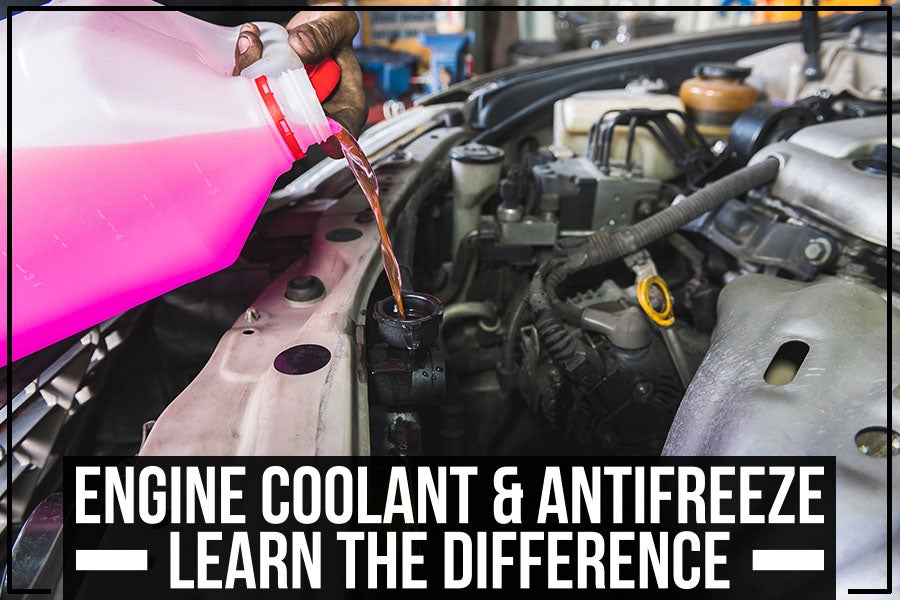Engine Coolant & Antifreeze: Learn The Difference

Key Takeaways
- Engine coolant and antifreeze are often used interchangeably, but these fluids serve distinct purposes.
- The coolant absorbs and dissipates heat away from the engine, regulating temperature indoors.
- Antifreeze is a substance added to the coolant to prevent it from freezing
- Checking and maintaining coolant flow prevents engine overheating
- Watch out for signs of low coolant levels, and stay proactive to avoid damages from low coolant levels
- A trip to the auto technician can help you avoid engine overheating problems
Regarding vehicle engine temperature maintenance and winter weather protection, there's a lot of confusion about engine coolant and antifreeze. Keep reading for an understanding of engine coolant & antifreeze – plus some tips on choosing the proper radiator fluid for your car.
Why Does Your Engine Need to Stay Cool?
Your engine produces heat when it runs. That heat must go somewhere, or your engine will overheat and break down. The coolant in the radiator helps regulate the engine's temperature by transferring the heat away from the engine block and into the coolant itself.
Coolant turns into steam and stops working effectively when it gets too hot. That's why it's essential to check your coolant levels regularly (especially in summer) and top up if necessary. If you notice dropping coolant levels, don't add water – this will lower the boiling point and make overheating more likely. Make sure you use a coolant diluted with water to help reduce the coolant's freezing point.
How is Coolant Made?
Coolant is made by mixing water and antifreeze (usually ethylene glycol based). These two ingredients work together to lower the coolant’s freezing point and raise its boiling point. The boiling point is important because it ensures that the coolant won’t turn into steam too quickly, and the freezing point is essential because it prevents the coolant from freezing in winter (which could cause your engine to crack).
What Does Coolant Do?
As discussed above, coolant helps regulate engine temperature by absorbing heat and transferring it away from vital engine components. It also helps to prevent corrosion by creating a barrier between metal surfaces.
What is Antifreeze?
Antifreeze is a coolant with additional ingredients to help lower its freezing point even further. This is important for two reasons: first, it ensures that the coolant won’t freeze in winter; second, it helps prevent engine overheating in summer (by raising the coolant’s boiling point).
How are Antifreeze and Coolant Different?
The main difference between coolant and antifreeze is the additional ingredients in antifreeze that help lower its freezing point. Other than that, coolant and antifreeze do essentially the same thing, regulate the engine temperature.
What are the Different Types of Antifreeze?
Two main types of antifreeze are organic acid technology (OAT) and hybrid organic acid technology (HOAT). The type you need depends on your vehicle; consult your owner’s manual or a qualified mechanic to be sure.
What to Consider When Choosing a Coolant Mixture?
The most commonly used option is a 50/50 antifreeze to the water mixture. A 50/50 antifreeze to water mixture will protect your engine up to -34 degrees Fahrenheit, while a pre-mixed coolant will protect it to -60 degrees Fahrenheit. You should also consider the color of the antifreeze; red, yellow, and green are all standard colors.
How to Flush the Radiator Fluid?
You should flush radiator fluid every two years or 24,000 miles as part of your car's preventive maintenance. The process is simple:
- Open the hood, locate the radiator cap and unscrew it
- Pour coolant/antifreeze into the coolant reservoir until it is full
- Replace the radiator cap and start the engine
- Turn on the heat to high and let the engine run for ten minutes
- Shut off the engine and let the car cool down
- Pour the old coolant/antifreeze out of the coolant reservoir and replace it with fresh coolant/antifreeze
Signs Your Coolant Levels Are Running Low
If you notice any of the following signs, it’s time to add coolant to your car:
- The coolant light on your dash is illuminated
- Your engine is overheating
- You see coolant leaks under your car
- Your coolant levels are low
If you have to add coolant to your car frequently, there may be a more severe issue with your cooling system, and you should take your vehicle to a mechanic for diagnosis.
Why Is It Important to Use the Right Coolant/Antifreeze? -
Different types of coolant/antifreeze are formulated for different engine types. Using the wrong type of coolant/antifreeze in your engine can cause severe damage and lead to costly repairs.
Using the coolant/antifreeze recommended by your car’s manufacturer is essential. You can usually find this information in your owner’s manual or a sticker inside the engine compartment.
Why Should You Change Coolant Levels Regularly?
Even if you’re using the correct coolant/antifreeze, it’s still important to change coolant levels regularly. Over time, coolant can become contaminated with rust, scale, and other debris. The coolant's acidic nature can cause corrosion, resulting in misfires and reduced efficiency. Not paying to increasingly acidic coolant levels results in warped cylinder heads and blow gaskets. In extreme cases, an overheated engine can seize up, causing irreparable damage.
What to Consider When Choosing an Auto-Technician for Radiator Problems?
When you take your car to an auto-technician for an overheating problem, they must use a suitable coolant. Many coolants on the market are only "universal," meaning they can be used in any make or model of vehicle. However, if your car requires a specific coolant, using the wrong one could cause more damage than good.
Also, ensure the technician is reputable and has experience working on your make and model of car. This will help avoid any potential problems arising from inexperienced work.
Your engine is a complex system and needs the right mix of coolant to protect it from overheating. Here at John Lee's Mazda serving Sunnyside, FL, we ensure you have all the information you need about coolant to keep your car running smoothly. Be sure to schedule a service with us if you have any questions or concerns about your engine cooling system – we would be happy to help!

